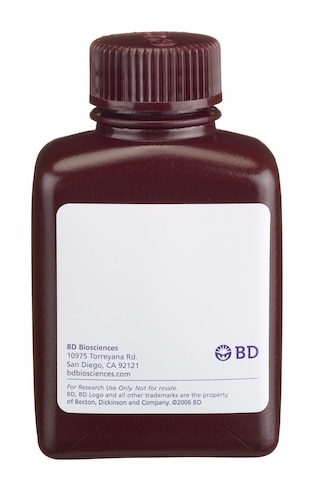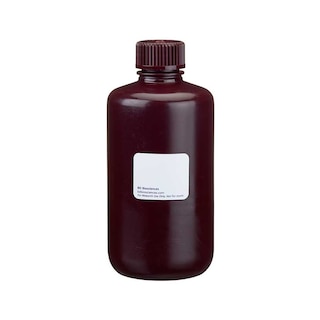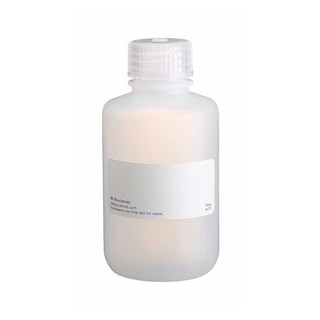Old Browser
This page has been recently translated and is available in French now.
Looks like you're visiting us from {countryName}.
Would you like to stay on the current country site or be switched to your country?


.png)

Multicolor flow cytometric analysis of IL-9 expression by unstimulated and activated mouse spleen cells. Mouse spleen cells were either unstimulated (Left Panel) or stimulated in a tissue culture plate coated with Anti-Mouse CD3e and soluble Anti-Mouse CD28 antibodies along with Recombinant Mouse IL-2, IL-4, and TGF-β proteins and Anti-Mouse IFN-γ antibody for 4 days. On day 4 the cells were harvested and restimulated with Phorbol 12-Myristate 13-Acetate (PMA; Sigma P-8139) plus Ionomycin (Sigma; I-0634) in the presence of BD GolgiStop™ Protein Transport Inhibitor for 5 hours (Right Panel). The cells were then fixed and permeabilized using a BD Cytofix/Cytoperm™ Fixation/Permeabilization Solution Kit followed by staining with PE Armenian Hamster anti-Mouse IL-9 (Cat. No. 561463) and Alexa Fluor® 647 Rat Anti-Mouse CD4 (Cat. No. 557681). Two-color flow cytometric dot plots showing the correlated expression patterns of CD4 versus IL-9 were derived from gated events with the forward and side light-scatter characteristics of intact lymphocytes. Flow cytometry was performed using a BD™ LSR II Flow Cytometer System. Other compatible fixation and permeabilization treatments are listed in the Suggested Companion Products.
.png)

BD Pharmingen™ PE Armenian Hamster anti-Mouse IL-9
.png)
Regulatory Status Legend
Any use of products other than the permitted use without the express written authorization of Becton, Dickinson and Company is strictly prohibited.
Preparation And Storage
Recommended Assay Procedures
This fluorescent antibody is suitable for intracellular staining of mouse leukocytes using BD Cytofix/Cytoperm™ Reagents or BD Phosflow™ Fix Buffer I and Perm/Wash Buffer I (please see Suggested Companion Products).
Product Notices
- Since applications vary, each investigator should titrate the reagent to obtain optimal results.
- Please refer to www.bdbiosciences.com/us/s/resources for technical protocols.
- For fluorochrome spectra and suitable instrument settings, please refer to our Multicolor Flow Cytometry web page at www.bdbiosciences.com/colors.
- Caution: Sodium azide yields highly toxic hydrazoic acid under acidic conditions. Dilute azide compounds in running water before discarding to avoid accumulation of potentially explosive deposits in plumbing.
Companion Products






The D9302C12 monoclonal antibody specifically binds to the multifunctional mouse cytokine, Interleukin-9 (IL-9). IL-9 is a 126 amino acid-long glycoprotein that is produced by various subsets of activated CD4+ T cells. IL-9 acts on target cells by binding to and signaling through the heterodimeric IL-9 receptor (IL-9R) complex that is comprised of transmembrane IL-9 receptor alpha (IL-9Rα) and common gamma chain (γc) subunits. IL-9 can promote the survival, growth, proliferation and/or differentiation of various cell types including thymocytes, T cells, B cells, mast cells, and hematopoietic progenitor cells. IL-9 can augment IL-4-induced IgE and IgG1 production from lipopolysaccharide-primed mouse B cells and induce granzyme and high-affinity IgE receptor gene expression by mouse T helper cell clones and mast cell lines. IL-9 plays an important role in vivo in helminth elimination. The D9302C12 antibody neutralizes mouse IL-9 bioactivity.

Development References (8)
-
Faulkner H, Humphreys N, Renauld JC, Van Snick J, Grencis R. Interleukin-9 is involved in host protective immunity to intestinal nematode infection. Eur J Immunol. 1997; 27(10):2536-2540. (Biology). View Reference
-
Hultner L, Druez C, Moeller J, et al. Mast cell growth-enhancing activity (MEA) is structurally related and functionally identical to the novel mouse T cell growth factor P40/TCGFIII (interleukin 9). Eur J Immunol. 1990; 20(6):1413-1416. (Biology). View Reference
-
Louahed J, Kermouni A, Van Snick J, Renauld JC. IL-9 induces expression of granzymes and high-affinity IgE receptor in murine T helper clones. J Immunol. 1995; 154(10):5061-5070. (Biology). View Reference
-
Petit-Frere C, Dugas B, Braquet P, Mencia-Huerta JM. Interleukin-9 potentiates the interleukin-4-induced IgE and IgG1 release from murine B lymphocytes. Immunology. 1993; 79(1):146-151. (Biology). View Reference
-
Renauld JC, Kermouni A, Vink A, Louahed J, Van Snick J. Interleukin-9 and its receptor: involvement in mast cell differentiation and T cell oncogenesis. J Leukoc Biol. 1995; 57(3):353-360. (Biology). View Reference
-
Suda T, Murray R, Fischer M, Yokota T, Zlotnik A. Tumor necrosis factor-alpha and P40 induce day 15 murine fetal thymocyte proliferation in combination with IL-2. J Immunol. 1990; 144(5):1783-1787. (Biology). View Reference
-
Van Snick J, Cayphas S, Vink A, et al. Purification and NH2-terminal amino acid sequence of a T-cell-derived lymphokine with growth factor activity for B-cell hybridomas. Proc Natl Acad Sci U S A. 1986; 83(24):9679-9683. (Biology). View Reference
-
Van Snick J, Goethals A, Renauld JC, et al. Cloning and characterization of a cDNA for a new mouse T cell growth factor (P40). J Exp Med. 1989; 169(1):363-368. (Biology). View Reference
Please refer to Support Documents for Quality Certificates
Global - Refer to manufacturer's instructions for use and related User Manuals and Technical data sheets before using this products as described
Comparisons, where applicable, are made against older BD Technology, manual methods or are general performance claims. Comparisons are not made against non-BD technologies, unless otherwise noted.
For Research Use Only. Not for use in diagnostic or therapeutic procedures.
Report a Site Issue
This form is intended to help us improve our website experience. For other support, please visit our Contact Us page.